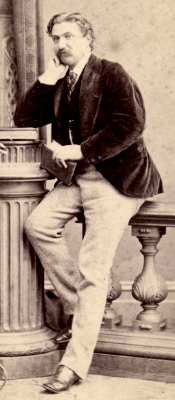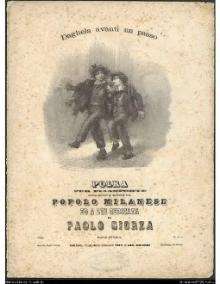Paolo Giorza
Paolo Giorza (11 November 1832 – 4 March 1914) was an Italian-Australian composer of classical music and Romantic music.[1][2]
Paolo Giorza | |
|---|---|
 Paolo Giorza 1870 | |
| Background information | |
| Born | November 11, 1832 Milan |
| Died | March 4, 1914 (aged 81) |
| Occupation(s) | Composer, Conductor, Teacher |
| Years active | 1850-1900 |
He was born in Milan, son of Luigi Giorza, a painter and singer. His father prompted his musical interest. He is revered in Milan, where he wrote the song "La bella Gigogin" in 1858, performed at the Milan Carcano Theatre. The song became symbolic of Italian culture.
During his lifetime, he produced and wrote many scores including various waltzes. Giorza travelled much of the world working in Venice, Vienna, London and Paris before embarking on an Australian career.[3] In 1871 he went to Australia where he succeeded as a composer. In 1884, he became unwell and returned to Europe and success at La Scala. He died on 4 May 1914.

Works
- Olympia Valse
- 1852 Cleopatra (dance)
- 1856 Tarantella nel ballo La giocoliera
- 1862 Ondina Polka, Op. 116
- Blumen aus Italien, Op. 217
- 1870 Messe Solennelle No.3[4]
- 1871 Trickett Galop (celebrating Edward Trickett, a champion Australian rower)
- 1877 Giulia Valse[5]
- 1879 The Old Corporal Quadrille
- 1883 Adieu Waltz (for his departure from Australia)
- 1877 The Geelong Skating Rink Galop
- 1890 Cardellino Polka, Op. 123
- Land of the Sunny South, All Hail, an Australian National anthem
- Scottisch, Op. 117
- 1879 Sydney Exhibition Cantata, with words by Henry Kendall
- 1882 The Bay of Sydney Waltz (La Baja di Sydney Valse)
Recordings
Scores
| Wikimedia Commons has media related to Paolo Giorza. |
Students
Giorza taught Australian composer Maude FitzStubbs (Mrs Harry Woods) while in Australia [8]
References
- "Giorza, Paolo (1832–1914) – People and organisations". Trove.
- Carmody, John. Australian Dictionary of Biography. National Centre of Biography, Australian National University – via Australian Dictionary of Biography.
- http://www.treccani.it/enciclopedia/paolo-giorza_(Dizionario-Biografico)/
- Original publication lists 1870 as composition date. See IMSLP https://imslp.org/wiki/Messe_Solennelle_No.3_(Giorza%2C_Paolo)
- Giorza, Paolo; Foster & Martin (Melbourne, Vic.) (13 September 1877). "Giulia valse". Melbourne : Nicholson & Ascherberg – via Trove.
- "Giorza The Belles of Australia Waltz No.5".
- "Giorza: The Trickett Gallop on CD & download (MP3 & FLAC) – Buy online from Presto Classical". www.prestoclassical.co.uk.
- "AN AUSTRALIAN MUSICIAN". The Advertiser. XXXVIII, (11555). South Australia. 30 October 1895. p. 7. Retrieved 11 July 2020 – via National Library of Australia.CS1 maint: extra punctuation (link)